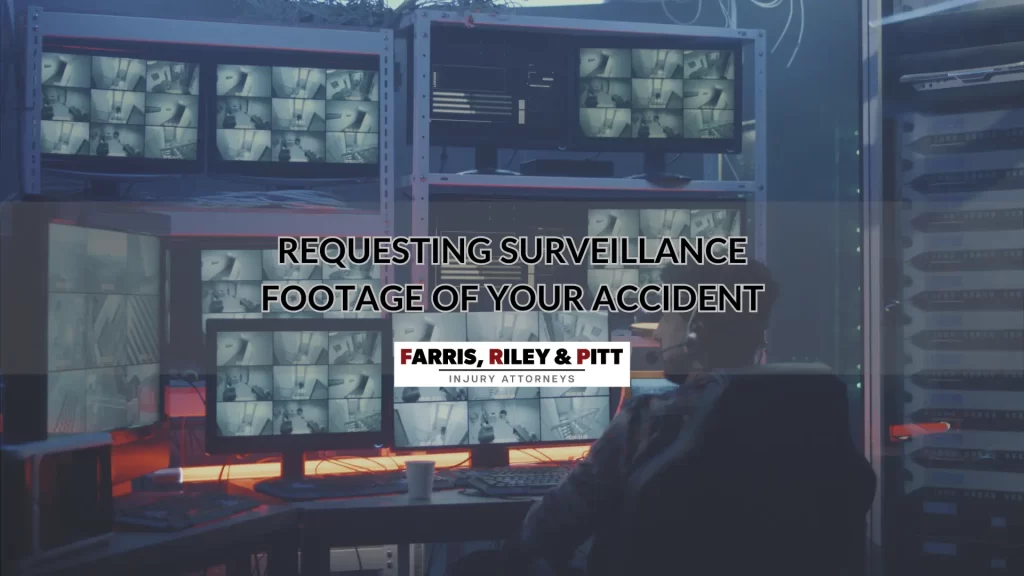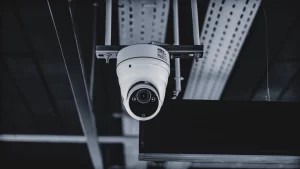Posted on Sunday, January 1st, 2023 at 9:01 am

One of the first things a personal injury attorney will do when taking on a new client is to request surveillance footage of their car accident. This footage can provide valuable evidence to show who was at fault for the accident and can be crucial in securing fair compensation for any damages or injuries you might have suffered.
With that said, security footage is often overwritten or deleted to make room for more data. Our clients often wonder how long security cameras retain footage. This post will explore why requesting footage as soon as possible is crucial.
How Long Do Security Cameras Keep Footage?
The length of time that security cameras retain footage can vary depending on many factors, including the type of camera, the storage capacity of the device, and the specific policies of the organization or business that owns the camera.
For example, some cameras have a built-in storage capacity that can hold several days’ or even weeks’ worth of footage. Other cameras may rely on an external storage device, such as a digital video recorder (DVR) or a network video recorder (NVR), either of which can store footage for more extended periods.
Along with the type of camera and storage capacity, the retention policies of the organization or business that owns the camera can also play a role in determining how long footage is kept. For example, some organizations may have policies in place requiring them to keep footage for a certain period. In contrast, others may only keep footage for as long as it’s needed for a specific investigation or legal case.
Is There a Legal Requirement to Retain Surveillance Footage?
When it comes to the retention of surveillance footage, the laws can vary by jurisdiction. In some states, specific legal requirements dictate how long footage must be kept, while in others, there is no such requirement.
There is currently no legal requirement for businesses or organizations to retain surveillance footage in Alabama. This means that footage retention is left up to the discretion of the individual business or organization. This lack of a retention requirement can make it more difficult to obtain footage in the event of a car accident.
This is why it’s extremely important to contact a lawyer as soon as possible after an accident. An experienced attorney can handle the process of requesting surveillance footage, and they can also advise you on other potential sources of evidence, such as eyewitness statements or police reports.
An attorney can also advise you about the best way to preserve the footage and ensure that the footage is not tampered with or destroyed. Working with an attorney as soon as possible can increase your chances of obtaining the footage and also help to ensure that your rights are protected.
It Pays to Request Footage ASAP
 Any Birmingham car accident attorney will recommend that their clients request surveillance footage as soon as possible after an accident. This is because, in many cases, the longer you wait to request footage, the less likely it is to still be available. It’s important to understand that security footage is often overwritten after a certain time, so if you wait too long, the footage of your accident may simply no longer exist.
Any Birmingham car accident attorney will recommend that their clients request surveillance footage as soon as possible after an accident. This is because, in many cases, the longer you wait to request footage, the less likely it is to still be available. It’s important to understand that security footage is often overwritten after a certain time, so if you wait too long, the footage of your accident may simply no longer exist.
If you’ve been hurt in a car accident, it’s important that you notify the police immediately. In many cases, the police will also request footage from any nearby security cameras as part of their investigation. By notifying the police as soon as possible, you can increase the chances that the footage of your accident will be preserved.
A Birmingham Car Accident Attorney Can Help
Surveillance footage can be an extremely valuable piece of evidence in a car accident case. If you’ve been hurt in a car accident, you should request footage as soon as possible and understand that the length of time that footage is kept can vary depending on many factors.
If you’ve been hurt in a car accident in or around Birmingham that wasn’t your fault, our dedicated Birmingham car accident attorneys can review the circumstances of your case and assess its value. Get started today with your free consultation.















